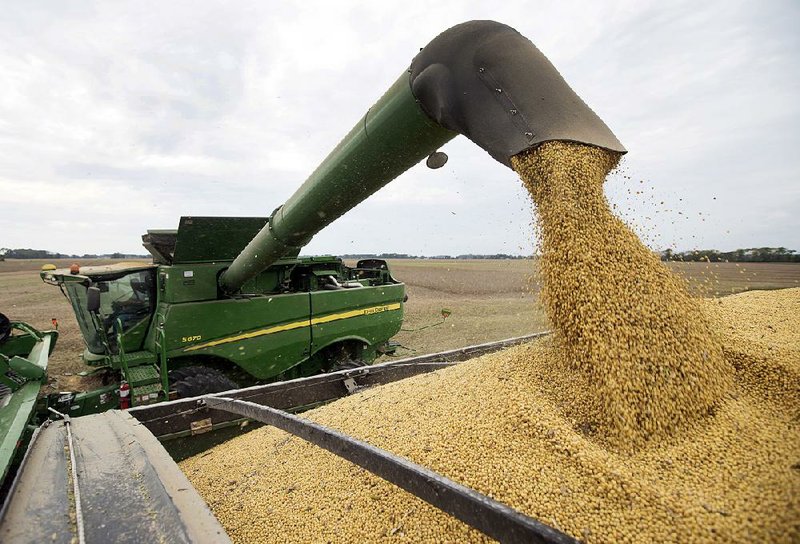WASHINGTON -- Soybeans account for less than 1 percent of all the goods and services the United States sells the rest of the world.
But somehow the humble legumes are upstaging weightier, thornier issues as the Trump administration tackles trade disputes with China, the European Union and other trading partners. Critics worry that focusing on getting foreigners to buy soybeans and other U.S. goods is a distraction from pushing them to make deeper economic reforms that would offer longer-lasting benefits to the United States.
The outsize importance of soybeans -- mostly used as animal feed but also consumed by humans in everything from General Tso's Tofu to soy lattes -- was apparent again recently in two days of U.S.-China trade talks.
The world's two biggest economies didn't make much progress on their differences over the aggressive tactics -- including cybertheft -- that Beijing is accused of using to challenge U.S. supremacy in cutting-edge industries like driverless cars and artificial intelligence.
But to the president's delight, they did agree on one thing: In an unexpected deal that even surprised the top U.S. trade negotiator, China said that it would buy 5 million metric tons of American soybeans over an unspecified period.
"China as a sign of goodwill has agreed to purchase a tremendous, massive amount of soybeans," President Donald Trump told reporters.
He said he had consulted with Agriculture Secretary Sonny Perdue and learned that "our farmers are extremely happy."
"It's a nice kind of olive branch," said Peter Meyer, head of grain and oilseed analytics at S&P Global Platts.
Soybeans, which accounted for just $21.5 billion of $2.4 trillion in U.S. exports in 2017, seem to be punching above their weight in U.S. trade policy.
Farming is one of the few areas in which the United States sells more to the rest of the world than it buys, China included. Powerful lobbies represent American agricultural interests in Washington. And farmers tend to be enthusiastic Trump supporters.
Arkansas farmers planted nearly 3.6 million acres of soybeans in 2018, slightly more than in 2017, according to the latest report available from the Department of Agriculture. Soybean production in Arkansas was estimated by the USDA in September at 178.5 million bushels.
Arkansas generally is the nation's 10th- or 11th-largest soybean producer, with an annual crop value of $1.7 billion. About 50 percent of the state's soybean crop is exported, according to the Arkansas Farm Bureau.
Because of the 35-day partial government shutdown, the USDA has delayed the release of about 50 crop-progress reports, including those on soybean production.
The emphasis on soybeans has drawbacks, critics say. In the confrontation with China, for example, it diverts attention from the tough tech issues that divide the world's two biggest economies and may decide whether Beijing or Washington presides over the economy of the future. And it implies that the Chinese might be able to avoid substantive concessions on their economic policies simply by agreeing to buy more American stuff and putting a dent in the U.S. trade deficit with China. That amounted to $336 billion in 2017 and was likely higher last year.
"There's confusion about what the administration's objectives are," said Rufus Yerxa, president of the National Foreign Trade Council and a former U.S. trade official.
In a letter last week, Senate Minority Leader Charles Schumer of New York and fellow Democratic Sens. Ron Wyden of Oregon and Sherrod Brown of Ohio warned Treasury Secretary Steven Mnuchin that any deal with China should force Beijing to end the abusive practices that put U.S. tech companies at a competitive disadvantage and to enact fundamental economic reforms that would make the Chinese market more accessible to U.S. and other foreign firms.
An agreement that settles for Chinese purchases of American goods, intended to narrow the trade deficit, would be viewed on Capitol Hill as "an abject failure," they wrote.
Soybeans have taken a prominent place in previous Trump administration trade talks. The United States and the European Union at least temporarily backed away from a potential trade war over cars last July when the Europeans agreed, among other things, to load up on American soybeans.
America's trading partners are well aware of the outsize influence farmers enjoy in Washington. When Trump last year started imposing import taxes on Chinese goods and on foreign steel and aluminum, they targeted their retaliation on the American heartland, imposing tariffs on soybeans and other farm products.
Before the trade hostilities broke out last year, China bought nearly 60 percent of the soybeans the United States exported. Then the tariffs kicked in: In the first 10 months of 2018, U.S. soybean exports to China dropped to 8.2 million metric tons from 21.4 million metric tons a year earlier -- a 62 percent free fall, according to the USDA.
The backlog of unsold soybeans also pushed down U.S. prices, spreading more pain in farm country.
Information for this article was contributed by Darlene Superville and Deb Riechmann of The Associated Press and by Stephen Steed of the Democrat-Gazette.
Business on 02/06/2019
